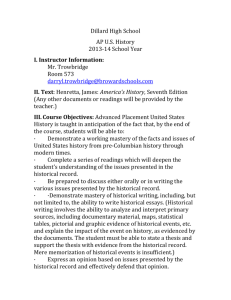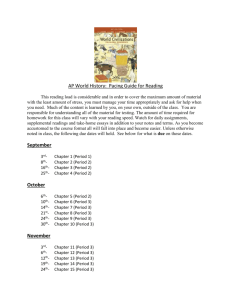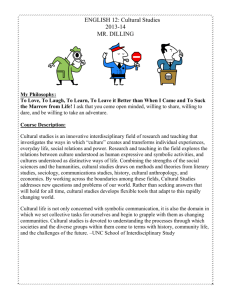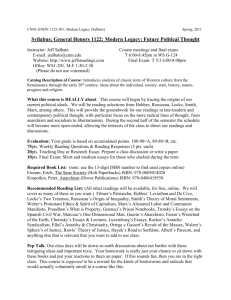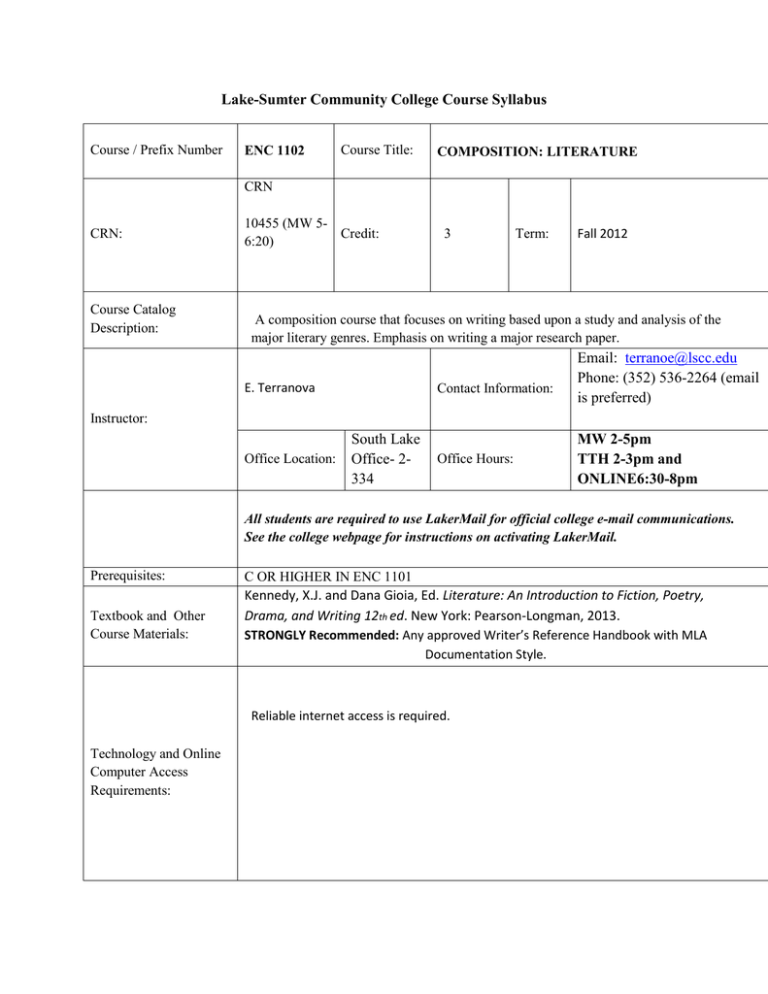
Lake-Sumter Community College Course Syllabus
Course / Prefix Number
ENC 1102
Course Title:
COMPOSITION: LITERATURE
CRN
CRN:
Course Catalog
Description:
10455 (MW 5Credit:
6:20)
3
Term:
Fall 2012
A composition course that focuses on writing based upon a study and analysis of the
major literary genres. Emphasis on writing a major research paper.
E. Terranova
Contact Information:
Email: terranoe@lscc.edu
Phone: (352) 536-2264 (email
is preferred)
Instructor:
Office Location:
South Lake
Office- 2334
Office Hours:
MW 2-5pm
TTH 2-3pm and
ONLINE6:30-8pm
All students are required to use LakerMail for official college e-mail communications.
See the college webpage for instructions on activating LakerMail.
Prerequisites:
Textbook and Other
Course Materials:
C OR HIGHER IN ENC 1101
Kennedy, X.J. and Dana Gioia, Ed. Literature: An Introduction to Fiction, Poetry,
Drama, and Writing 12th ed. New York: Pearson-Longman, 2013.
STRONGLY Recommended: Any approved Writer’s Reference Handbook with MLA
Documentation Style.
Reliable internet access is required.
Technology and Online
Computer Access
Requirements:
Course Objectives:
(what the course will do)
1. Development of Composition Skills: Students will select an appropriate subject,
determine the purpose for writing, limit the subject, and formulate a thesis statement
which reflects the purpose of the essay. Students will develop each composition through
an introduction, topic sentences, supporting details, and a conclusion. In this course the
thesis will be an idea drawn from a work of literature. Students will revise, edit, and
proofread their essays to assure clarity, consistency, and conformity to the conventions
of standard American English. Students will develop an increased facility with word usage
and sentence structure. They will work toward conciseness and pre-ciseness. Students
will review grammar and mechanics as problems arise in their com-positions.
2. Knowledge of and practice with research techniques: Students will practice re-search
procedures and will demonstrate knowledge of citation and documentation.
3. Appreciation of Literature: Students will think critically, analytically, and logical-ly and
will learn to work with the abstract ideas, as well as the concrete concepts. They will be
expected to analyze and interpret, as well as explicate the literature. Students will
develop an aesthetic and intellectual appreciation of literature through the study of
selected short stories, poems, and dramas. Students will analyze conflict, character,
theme, point of view, setting, mood, tone, and symbolism. Students will demonstrate
competence in composition and literary analysis in essays and on examinations.
Outcome: To demonstrate analytical thinking skills by assessing and evaluating writing samples.
Competencies: Read & analyze texts produced by others, learning from and synthesizing the information and
write well-reasoned essays that present coherent, unified, and well-developed points
Outcome: To demonstrate the ability to research an academic subject, synthesize the material, and construct an
essay employing an accepted academic documentation system.
Competencies: Write formal research paper(s) utilizing proper MLA Style for format & documentation.
Utilize academically accepted resources in the creation of research project(s).
Student Learning
Outcomes (SLOs)
Assessed in this Course:
(what the students take
with them beyond this
course)
Outcome: To effectively choose a subject, employ an appropriate organizational scheme and write an essay which
illustrates college-level language and communication skills.
Competencies: Write & edit essays that are relatively free of surface issues, including grammar, spelling, &
punctuation issues
Write & edit essays that employ accepted Standard English, use appropriate connotation/denotation, adopt an
academic level of formality, and avoid clichés, jargon, slang, doublespeak, etc.
Outcome: To effectively identify, discuss, and restate knowledge of various modes of development.
Competencies: Utilize a number of modes of development in written assignments. Those traditionally utilized
include narration, description, comparison, cause/effect, classification/division, process analysis, definition, &
argument.
Outcome: To recognize the importance of planning and creating projects in a timely manner to meet both a list of
criteria and a deadline.
Competencies: Use the writing process to follow through a major research project: choosing an appropriate topic,
formulating a valid thesis, outlining a project, gathering resources, producing the paper/project, revising it
thoroughly, & proofreading it effectively.
Academic Integrity:
Important Information
for Students with
Disabilities:
The successful functioning of the academic community demands honesty, which is the basis
of respect for both ideas and persons. In the academic community, there is an ongoing
assumption of academic integrity at all levels. There is the expectation that work will be
independently thoughtful and responsible as to its sources of information and inspiration.
Honesty is an appropriate consideration in other ways as well, including but not limited to the
responsible use of library resources, responsible conduct in examinations, and the responsible
use of the Internet. (See college catalog for complete statement.)
Any student with a documented disability who requires assistance or academic
accommodations should contact the Office for Students with Disabilities immediately to
discuss eligibility. The Office for Students with Disabilities (OSD) is located on the Leesburg
Campus, but arrangements can be made to meet with a student on any campus. An
appointment can be made by calling 352-365-3574 and specific information about the OSD
and potential services can be found at www.lscc.edu, then go to “Quick Links” and click on
Disability Services.
The Family Educational Rights and Privacy Act (FERPA) (20 U.S.C. § 1232g; 34 CFR
Part99) is a Federal law that protects the privacy of a student’s education records. In order for
Privacy Policy (FERPA): your information to be released, a form must be signed and in your records located in the
Admissions/Registrar’s Office.
Attendance / Withdrawal
Policies:
Withdrawal Deadline:
Students are expected to keep informed about all assignments by carefully following the
Tentative Assignment schedule at the end of this syllabus and by routinely checking Laker
Mail. Failure to hand in any of the assignments on time will result in a failing grade for that
assignment. Students deciding to discontinue class attendance have the responsibility for
formal withdrawal from class prior to the date published in the catalog, October 29,2012.
Withdrawal forms are available from the counseling center. Failure to withdraw properly
from class will result in a grade of “F” in the course.
Monday, October 29, 2012
The student’s work will be judged against accepted academic standards for writing
and documentation.
Methods of Evaluation:
Grading Scale:
Course Calendar:
15%: Assessments: Weekly Reading Assignments
20%: Participation
20%: Assignments: Two(2) Literary Analysis Essays (10% each)
(Min. 800 words- 1 primary & 1 secondary source)
30%: Assignments: One(1) Literary Analysis Essays Argument
(Min. 800 words- 1 primary & 1 secondary source)
15%: Final Exam
90-100 = A
89-80 = B
79-70 = C
69-60 = D
59 or below = F
See below
Classroom Rules and
Policies:
Violence Statement:
Syllabus Disclaimer:
ESSAY ASSIGNMENTS:
ALL Essay Assignments must be prepared in a formal MLA format.
ESSAYS Complete Drafts are defined as essays that meet ALL assignment criteria
including format, word count, and appropriate number of sources.
Late Work: Accepted under extreme circumstance if formally requested via email. Late
work is subject to a penalty of one-letter grade per day. If a file cannot be opened with the
instructor’s software, then the submission is considered late and will be penalized
accordingly.
MLA Essay Format: All out of class essays must be submitted in formal MLA Format.
Any essays failing to meet the following criteria will not be graded:
1. Typed/Word Processed in 12 pt. font (Times New Roman)
2. Double-spaced with one (1) inch margins for sides, top, and bottom.
3. Contain a heading on the first page (NO COVER SHEETS).
4. Contain headers on ALL pages including the works cited page.
5. Contain a works cited page with the required number of sources.
6. Contain a word count in the lower right hand corner of the last page of each essay.
7. NO EXTRA SPACES between the heading, title, paragraphs, or citations. Microsoft Word
2007 adds 10 pts. each time the enter key is pressed. Instructions for correcting this issue with
paragraph formatting are located in the Instructor messages on Blackboard.
8. Works Cited page – double-spaced with hanging indent. (DO NOT use any auto-bib
programs).
WARNING: DO NOT USE any commercial website (.com) such as SparkNotes,
ClassicNotes, Wikipedia, etc. as “critical sources.” While these sites may offer helpful
summaries of major works of literature, they do not contain the detail or the language of a
peer-reviewed scholarly journal.
Lake-Sumter Community College has a policy of zero tolerance for violence as stated in
College Board Rule 2.17. Appropriate disciplinary action will be taken in accordance with
Board Rule 2.17.
Information contained in this syllabus is, to the best knowledge of this instructor, considered
correct and complete when distributed to the student. The instructor reserves the right, acting
within policies and procedures of Lake-Sumter Community College, to make necessary
changes in course content or instructional techniques without prior notice or obligation to the
student.
Course Calendar (Tentative):
Week One- 8/22-8/26- Introduction Module
ORIENTATION ACTIVITIES:
Personal Introduction Assignments:
Write a personal/academic introduction of yourself (200 words)
Week Two-8/29-9/2- Short Story Module
READINGS & ACTIVITIES
View Power Points
“Chapter 1: Reading a Story – (5-6 & 14-16 )
“Chapter 2: Point of View” (27-31 & 80-82)
“Chapter 3: Character” (83-85 & 117-19)
“Chapter 4: Setting” (120-122 & “Writing” 145-47)
“Writing About a Story” (1908-15 & 1919-22) (focus on “Analysis” 1919-22)
“Brownies” (ZZ Packer 38-51)
“Young Goodman Brown” ( Hawthorne 92-101)
“The Storm” (Chopin 123-126)
Week Three-9/3(HOLIDAY)-9/07- Short Story Module
READINGS & ACTIVITIES
View Power Points
“Chapter 5: Tone and Style – (163-166 & 195-196 )
“Chapter 6: Theme (199-201 & 236-238)
“A Clean, Well-Lighted Place” (Hemingway 167-170)
“The Gift of the Magi” (Henry 184-187)
“How I Met My Husband” (Munro 218-229)
Week Four-9/10-9/14- Short Story Module
READINGS & ACTIVITIES:
“Chapter 7: Symbol (239-41 & “Writing” 271-74)
“A Good Man is Hard to Find” (O’Connor 419-30)
“Excerpts …” (O’Connor 457-60)
“A Good Source is Not So Hard to Find: The Real Life Misfit” (Tate 463-66
“Deconstructing ‘A Good Man Is Hard to Find’” (Schenck 466-67)
Week Five-9/17-9/21READINGS & ACTIVITIES: Short Story Module
Literary Analysis Assignment #1
Week Six-9/24-9/28- Poetry Module
READINGS & ACTIVITIES
View Power Points
“Irony” (700-702)
“Rite of Passage” (Olds 703)
“’The Golf Links” (Cleghorn 705)
“ Rejection Slip” (Lehman 708)
Week Seven- 10/1-10/5- Poetry Module
READINGS & ACTIVITIES
View Power Points
Chap 15: Words (716-718 & 720-726)
”Silence” (Moore 718)
”Lonely Hearts” (Cope 728)
”English con Salsa” (Valdes 733)
Week Eight- 10/08-10/12- Poetry Module
READINGS & ACTIVITIES
View Power Points
Chap 22: Closed Form (849-856)
“What lips my lips have kissed, and where, and why” (Millay 857)
”Unholy Sonnet:After the Praying” (Jarman 859)
”Do not go gentle into that good night” (Thomas 864)
Week Nine- 10/15-10/19- Poetry Module
READINGS & ACTIVITIES:
“Chap 23: Open Form (870-874 & 889-891)
“Buffalo Bill’s” (Cummings 874)
“Mourning Song” (Harjo 881)
”Swan and Shadow” (Hollander 883)
Week Ten- 10/22-10/26Literary Analysis #2 Poetry
Week Eleven- 10/29-11/2-Drama Module
READINGS & ACTIVITIES
View Power Points
Chap 34: Reading a Play (1151-1153)
”Trifles” (Glaspell 1153-1163)
Analyzing Trifles (1164-1168)
Glaspell on Writing- Creating Trifles (1168-1170)
.
Week Twelve- 11/5-11/09- Drama Module
READINGS & ACTIVITIES
View Power Points
Chap 38: The Modern Theater (1595-1597 & 1701-1703)
”The Glass Menagerie” (Williams 1653-1700)
Williams on Writing-How to Stage The Glass Menagerie (1700-1701)
Week Thirteen- 11/12 (Holiday)- 11/16- Drama Module
Readings:
Chap 37: Critical Casebook:Shakespeare (1284-1286 &1508-1512)
“Midsummer Night’s Dream” (Shakespeare 1512-1577)
Week Fourteen- 11/19-11/22 (Holiday 11/21-11/25)- Drama Module
Readings:
Chap 37: Critics on Shakespeare (Greer 1586- Bamber 1587)
Week Fifteen- 11/26-11/30-Drama Module/Final Module
Literary Analysis #3 Drama
Week Sixteen- 12/3-12/7- Final Module
Final Review
Final Exam



